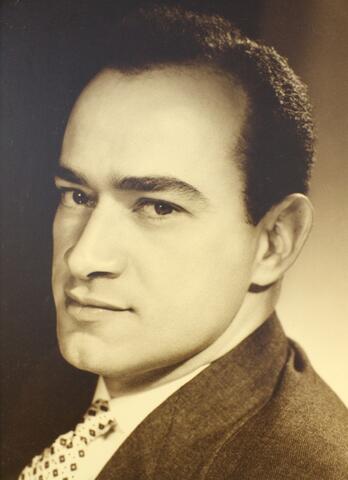
Identity area
Reference code
MT NAM PHO-2-79
Title
Date(s)
Level of description
Item
Extent and medium
Context area
Name of creator
Repository
Archival history
Asciak was born in Valletta and educated at St Paul’s school in Valletta and at the Archbishop’s seminary. His talent showed early and he spent years singing with the well-known St James choir, Valletta.
Asciak’s Malta operatic debut was as Turiddu in Mascagni’s Cavalleria Rusticana at the Radio City Opera House, Hamrun in 1946. His Italian debut took place in 1950 when he sang Manrico in Verdi’s Il Trovatore at Catanzaro’s Politeama Italia. The Italian Singer in Strauss’ Der Rosenkavalier was his UK debut at the Royal Opera House, Covent Garden, in 1952. Following participation in concerts with world-famous singers Tito Schipa and Maria Caniglia, Asciak was encouraged in his studies by the latter and he went to Rome in March 1950. Caniglia’s initiative led to Asciak’s being entrusted to renowned teacher Alberto Paoletti of Rome’s Teatro dell’Opera. In 1951 he won the Concorso per Giovani Cantanti Lirici together with, among others, Franco Corelli, Anita Cerquetti, and Gabriella Tucci. He was granted a bursary for voice and histrionic training under the guidance of Giuseppe Bertelli, Luigi Ricci, and Riccardo Picozzi at the Teatro dell’Opera, Rome. Ins the same Teatro’s Spoleto production of Aida in 1951, Asciak sang the part of Radames. Other leading roles in Italy were in Andrea Chenier, Carmen, Cavalleria Rusticana, I Pagliacci, Tosca, II Trovatore, and Norma.
Asciak joined the Royal Opera House Covent Garden Company in 1952 as tenor soloist also as guest artist and up to 1958 he had appeared over fifty times in various roles as Melon in Tristan sand Isolde, the Tenor Singer in Der Rosenkavalier, Flavio in Norma, Pinkerton in Madame Butterfly, and Radames in Aida. He sang with the Welsh National Opera Company, the Dublin Grand Opera, Carl Rota, and other companies until 1961. He performed several times on BBC sound and vision as well as on ITV (1952-59). Other lending roles in the UK included parts in Flotow’s Martha, Rigolletto, Arvino in I Lombardi, Il Trovatore, Cavalleria Rusticana, I Pagliacci, La Funciulla del West, Carmen, and Balfe’s Bohemian Girl.
Asciak gave numerous concerts and recitals, also including Verdi’s Requiem, mainly in Wales and his guest appearances in Malta at the Radio City Opera House, the Orpheum, and the Argotti Gardens summer productions were eagerly looked forward to and received much critical and popular acclaim. With visiting Italian companies, he sung leading roles in Malta in Ernani, Il Trovatore, Aida, and Otello, Carmen, and I Pagliacci. His recordings include Flavio in Norma with Callas (1952) and live performances (1953-59). He also featured in two CDs in 1997.
To coincide with his 85th birthday, Asciak released a new CD, a collection of live recordings from the 1950s.
Asciak retired from the stage in 1961 but joined the education department and finally retired in 1984 as head of department of music. He was director of music at St Edward’s college (1967- 73), honorary representative in Malta of Trinity College of Music, London (1965-89), and general manager of the Manoel Theatre (1988-92).
Asciak holds the LRSM (teaching and performing); the LTCM, the FLCM, and the FTCM. He is honorary member, TCM, and was awarded the Midalja ghall-Qadi tar-Repubblika in 1994, and the Malta Music Award in 1996. In 1999 Asciak was awarded the gold medal of the Malta Society of Arts, Manufactures and Commerce.
Asciak was married to the late Rina Ricci. They had three sons while their only daughter predeceased them in 1986.
Immediate source of acquisition or transfer
Content and structure area
Scope and content
Appraisal, destruction and scheduling
Accruals
System of arrangement
Conditions of access and use area
Conditions governing access
Conditions governing reproduction
Language of material
Script of material
Language and script notes
Physical characteristics and technical requirements
Finding aids
Allied materials area
Existence and location of originals
Existence and location of copies
Related units of description
Notes area
Alternative identifier(s)
Access points
Subject access points
Place access points
Name access points
Genre access points
Description control area
Description identifier
Institution identifier
Rules and/or conventions used
Status
Level of detail
Dates of creation revision deletion
Language(s)
Script(s)
Sources
Digital object metadata
Filename
Paul_Asciak.JPG
Latitude
Longitude
Media type
Image
Mime-type
image/jpeg
